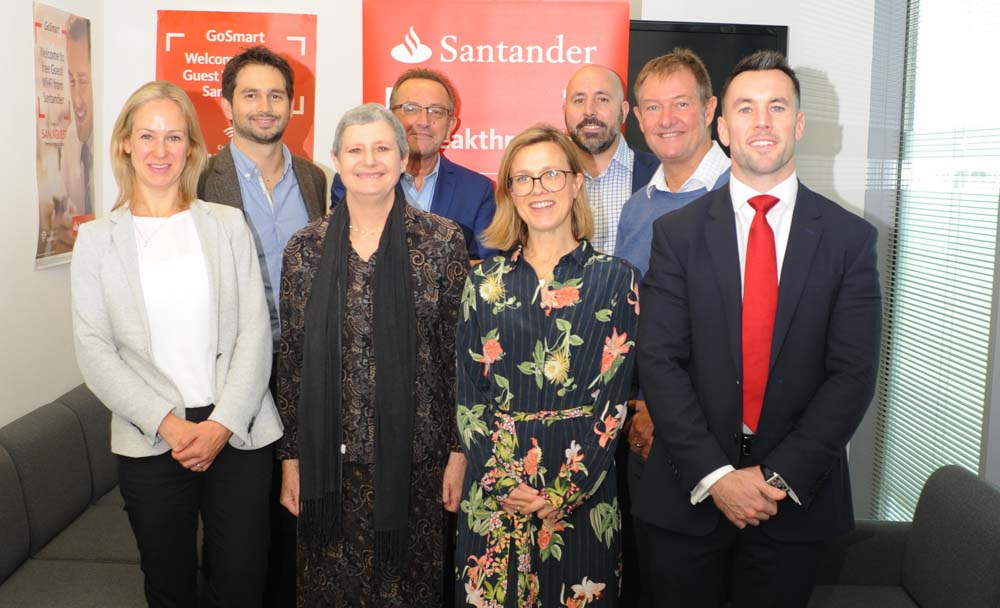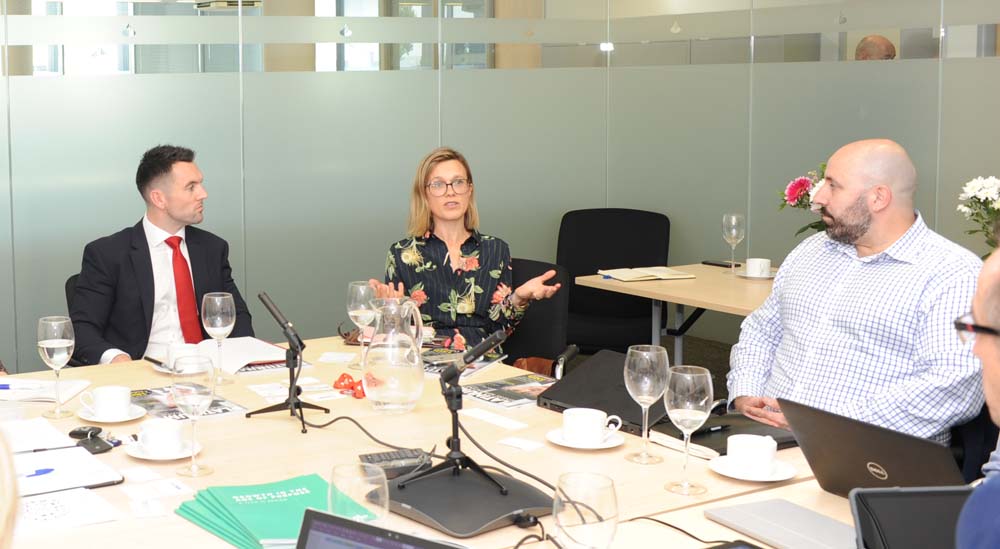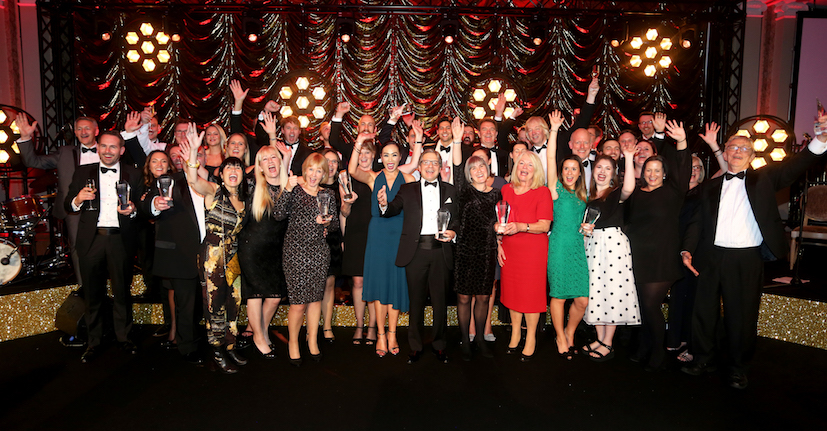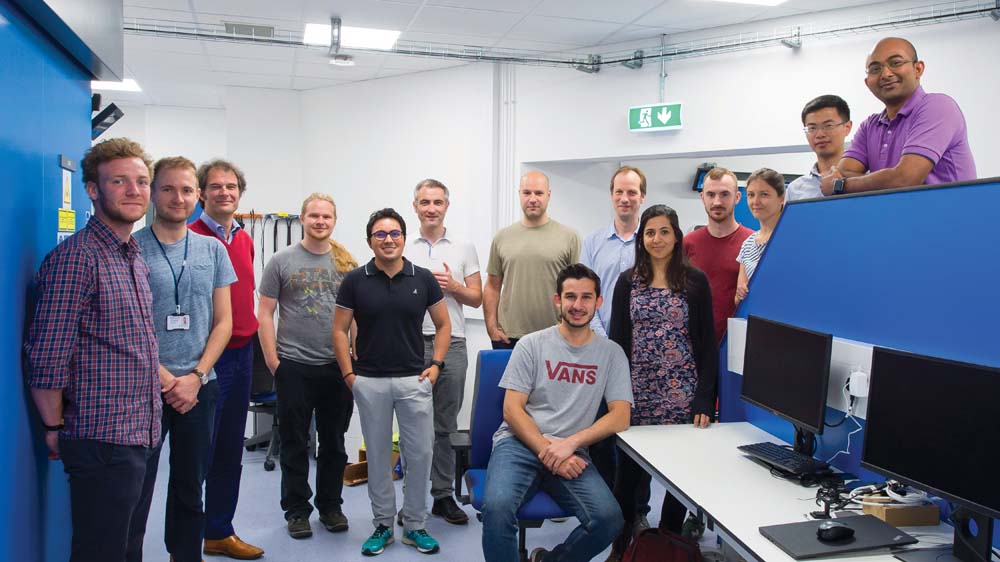
How do SMEs find funding for growth?
Are the right funding opportunities available?
And how will Brexit impact on lending?
These are some of the discussions that took place during the Santander Breakthrough Debate on Funding for Growth.
A group of funding proessionals and business owners gathered to discuss ways in which SMEs can access funding to enable then to grow.
All opinions expressed are those of the authors and do not necessarily represent the views of Santander
THE PANEL
David Budd - Funding Circle
Heath Lansbury - Shadow Foundr
Victoria Green - Victoria Green Limited (Santander Business customer)
Benjamin Earls - Santander Business
Amanda Geel - Coast 2 Capital LEP
Andy Turner - Let’s do Business
Laura Cockburn - BGF
Maarten Hoffmann - Platinum Publishing Group (Facilitator)
--
THE DEBATE
How is your business involved in the SME growth funding market?
David: We provide funding for businesses who have got past the initial stage of creating a business and proving there’s a market. We aim to make the process straightforward. We recognise that it’s very hard when you’re running a business to find the time to produce the figures that you need to get debt from a traditional source. We can quickly help them to get an answer without taking any tangible security, which is often the biggest challenge for an SME business. We always take a personal guarantee online but that is the only security we take.
Our loans are funded by investors, up to 77,000 people, so we need to make sure that the owners of the business who borrow are at least tied in some way to paying back that money.
We partner with Santander and other Banks, to support businesses that are not yet able to raise bank finance or might need a little extra help.
Victoria: I had a business account from Santander, but in truth I was absolutely clueless when it came to finance. When the time came when I needed to get funds into the business, I rang my Business Relationship Director and said, “I need to borrow £50,000, as I’ve got a contract with Debenhams - and they’re placing an order for 60,000 pieces.”
My business is wash bags, beauty bags and make-up bags. We will often take a large order from a big retailer a couple of times a year, rather than have steady flows of business.
I’ve developed a relationship with Santander and they’ve made the effort to understand my business and to pre-empt what I need in order to fund the business. My relationship director rings me up every month for an update.
Part of my funding is invoice finance, which I rely on the most.
Benjamin: Victoria’s story is not unusual. Businesses often go through organic growth and then suddenly get a big order that they don’t have the resources to fulfil. Their Business Relationship Director will sit down with the owner and get under the skin of the business. It’s not a case of: “Send me your figures, thanks very much.”
It doesn’t work.
We want to understand the full picture so that we can find the right solution for them. This could be an overdraft, invoice finance, a loan, trade finance or asset finance. Maybe a combination of more than one.
Andy: At Let’s Do Business we provide both start-up and growth loans from various sources including our own resources, LEPs or the tart-up Loan Company. My advice as an ex-relationship banker at NatWest, is always talk to your bank first if you need funding. Your bank should know how best to help you. If your bank can’t help you then you could look into other sources.
The funding landscape has changed beyond all recognition and there is a rich source of funds out there. Your bank should be able to point you in the right direction.
Heath: We are an investment platform and we pool our investors together. We are also on the equity side, but our sweet spot is between £200,000 and £500,000. We have 2,000 sophisticated, high net worth individuals who have opted into our database. They’re all over the UK and we look for scaling in growth stage companies. There are two things we look for: proof of concept and opportunity to disrupt the sector, and proof of revenue generation.
Usually we specialise in tech and renewable energy, but we look at anything that’s got the ability to scale. If you can do it in London, you can do it in New York, Dubai and all around the world.
Amanda: The aim of the Coast to Capital Growth Hub service is to help businesses in the region quickly find the most relevant support to address their growth ambitions. We will help you prepare your plans that will help increase your potential for raising funds to support your growth. If a business has a genuine need for funding for specific projects there can be grants for capital expenditure.
The Growth Hub is impartial and independent and that’s why it’s a very good reason to engage with an account manager because we’re not tied to anyone.
Laura: BGF is the UK’s most active investor in growing businesses. Typically, we invest in companies that have revenues of more than £1m, across earlier-stage, established and quoted businesses.
We provide patient capital to entrepreneurs looking to get to the next stage of growth in exchange for a minority equity stake. So we don’t own, control or buy companies.
In addition to funding, we introduce management teams to senior business leaders or sector experts from our talent network as potential chairs, non-executive directors and finance directors – people with significant experience either in growing and exiting smaller companies or at large companies in similar industries. The companies we back also appoint a BGF investor to the Board.
Our capital comes from high street banks, which means our model is different from traditional private equity as there is no set timetable for generating returns. Since 2011, we’ve invested more than £1.7 billion across 250 companies, making us the most active investor in the UK.
It’s brilliant news that there are greater options for growing business owners. More alternative funding means the ecosystem is richer and wider than it’s been previously, but it can also create confusion as to the right route to go down.
We build relationships locally and immerse ourselves in local business communities so that when a business is seeking funding, we’re around to start the conversation.
--
It’s about more than just funding…
Laura: Our network is some 5,000 people strong – with every sector of the economy represented. What we find is that entrepreneurs want to stay in control of their business and get high-quality support along the way. That’s what attracts people to our model.
Victoria: If the funding comes with a support package, it’s a win-win. If you invest in a company, you want them to succeed and, of course, the company wants to succeed. As a small business owner, I would be looking more for that kind of support rather than just money.
Andy: As a responsible lender we have a huge interest in the well-being of a business.
Benjamin: It’s worth remembering that Santander has ‘Relationship Directors’. I’ve seen many businesses where I’ve said, “Actually, we could maybe do a bit of bank funding here but it might be more appropriate for me to introduce you to Funding Circle or one of our other partners to explore what options they could provide with them. We want to support our customers with the best option for them.
David: Every business has different options in terms of the relationship they have with the people who help them get finance. Within 48 hours we can get from the first conversation with a client through to loan offer and money in the bank and so it feels like they don’t need to go through quite a long process and journey. It doesn’t have to be this three month process of getting underneath the projections of the business, the business plan, because we work on their track record. They have an account manager holding their hand the whole way through.
--
Relationship or convenience?
Andy: The alternative market has grown due to the ease of application for funding. You apply online and you can do it whenever you want, midnight if you want. And then it is the speed of decision. The alternative lenders have shaken up the market and perhaps made traditional lenders think of different ways of doing business.
Benjamin: Society has changed. Everybody wants everything now and they want an answer immediately, but we are seeing a lot of demand for more sophisticated loans – where businesses want larger loans and a relationship with someone who understand their business and can support them. Business owners often say: “I need you to help me find someone who can help me trade internationally.” Or: “I need you to introduce me to people who work in government grant schemes.” The alternative funding market actually complements what we are doing and we regularly signpost businesses to those alternative options.
Victoria: The thing that we’re coming back to time and time again is that it’s about the relationship that you have with the people that you’re working with - and it’s about them knowing your business and taking time to get to know your business. Meeting people you trust and know you can trust is a hugely important.
Heath: We are very much on the investor side of the fence but we have to work very closely with the entrepreneur to package up the proposition for our investors. So we have to work with both sides. We’ve got different types of investors and they’ve all got risk profiles. Some are sophisticated and they’ll go for the secure bridging type stuff, others have £100,000 that they’re happy to place £10,000 into ten different companies.
We started an access to finance workshop in the Midlands with grant funders, accountants and some angels. We look at all the different accesses to finance that people can have and help SMEs understand what sort of risks are involved.
Laura: We spend a lot of time with management teams. Some companies we invest in we might have known for a few years and we’ve maintained the relationship until they’re ready for investment. Others – because they have a more immediate funding requirement – the investment process might be much quicker. We like to introduce potential investee businesses to other companies in our portfolio and across our network to hear first-hand about their experience in partnering with us.
--
What do you look for in a business and/or management team when seeking to commit funds?
Amanda: There are actually quite a lot of events about access to funding. Access to finance, and understanding the different routes to finance, is a topic that comes up regularly, particularly with the chambers.
Education is very important. For instance in my role as a grant manager, I prefer to call the funds available as “tax payers’ money” rather “government money”, so everyone knows who’s paying for it. When it comes out of all of our pockets we might appreciate then that we’re all chipping into supporting a business. And people don’t treat the grants lightly.
Benjamin: We look for capable people who have a clear vision of what they want to achieve and know how they will set about doing it. Experience is invaluable too and helps to ensure that if things do not go as planned, the management team will be able to adapt and won’t be afraid to ask the Bank to help them to do this.
Laura: The quality of the management team is really important to us and we’ll discuss things like historical performance as well as the plans for how they will use BGF’s capital to pursue growth. Ultimately, we want to understand their goals and ambitions, and how we can support this. We have streamlined the standard due diligence processes associated with private equity, making it much more efficient. And we identify people from our network that have really relevant sector expertise to help with this.
David: We’re looking for a track record, both in the business and in the management team, and they will have shown the ability to generate cash to service a loan. We are a responsible lender and we do not over-indebt companies and end up ruining them down the line. We make sure that we lend in sustainable ways so that we can see what the business has done in the past and that they should be able to afford a loan we’re doing.
Heath: Our process is similar, we are always looking at the track record. We then go more into the valuation of the company and how they can justify the valuation. It’s the owners and the people that our investors will back at the end of the day. We put a CV together on everything that the entrepreneurs and the founders have done previously, to see if they’ve got a business mind. Because we’re FCA regulated we have to put a fully authorised information memorandum document which goes into huge amounts of detail.
We’re in a very high risk space. On the equity side we don’t have the debt side secured and our investors know that but there is a way to mitigate their risk by going through all of these checks.
Andy: The accounts are important, but for us it’s all about the non-financials. We’re very much windscreen rather than rear-view mirror, so we try and find reasons to lend, to do something rather than not. So for a start-up loan, for example, where they may be little or no track record it’s all about the people we meet in terms of their skills, their blend, what product or service they’re offering, what marketplace they’re in and how much they’ve thought about it.
--
When is equity the right source of funding for a business?
Heath: Usually in the early part of the journey because the SMEs are going through trialing where it will disrupt. They have to do the trial and error part. They have to come to the table, though, before they go to anyone with a proper plan in place and know exactly what they’re going to be doing. You’re not always going to have these cash flow projections that are going to be on the money.
David: When I was working for a bank, and clients were looking for large amounts of debt, we’d go through the whole process. What is really refreshing with the way that Funding Circle work is that for any owner-managed business, the most valuable resource they have is their time. Putting together a comprehensive business plan, projections going out over three years of paying it back, all those assumptions, is hugely time consuming. If our underwriters can see a business has already been trading successfully and is generating cash, it’s a strong sign they can afford a loan. We don’t make them do anything other than give us information they already have, which is their annual accounts and bank statements and means they can get that lending very quickly.
--
It’s all about the plan
Amanda: Coast to Capital has a partner called Finance South East and they look after our trade finance, our mezzanine debt fund and the Escalator Loan. I look after the grants available. A grant is a very opportunistic form of funding and I regard it as debt substitution. I’m very risk averse.
If we are offering a grant of say £170,000 then I would expect a robust business plan.
David: When I was working for a bank, and clients were looking for large amounts of debt, we’d go through the whole process. What is really refreshing with the way that Funding Circle work is that for any owner-managed business, the most valuable resource they have is their time. Putting together a comprehensive business plan, projections going out over three years of paying it back, all those assumptions, is hugely time consuming. If our underwriters can see a business has already been trading successfully and is generating cash, it’s a strong sign they can afford a loan. We don’t make them do anything other than give us information they already have, which is their annual accounts and bank statements and means they can get that lending very quickly.
Heath: We like any company that has gone through the wringer to get a grant because so much work is being put in. As we’re in that scaling phase, it works really well if you can work with a grant and equity.
Amanda: A grant should not be the first and only source of finance. A grant will only ever be 40% or 30% of the funding needed. It’s about project financing. It’s about funding a project, not about funding your business. People shouldn’t say: “I need that money next week.” We are not offering an overdraft facility. It’s free money and it can unlock other funds because we de-leverage. For instance, your bank might say: “If they give you a grant then our appetite is a bit more comfortable.” The grant is for capital equipment It’s all asset based.
David: With a business plan, the real test is in a year’s time when you go back and see that business. Does it look exactly the same as when you last saw it? Or are the pages worn out, are there scribbles all over it, because that’s a live business plan.
Amanda: A business plan is not a one-off document. Once all that hard work has been done it can be used to help the bank release funds. They will realise that this a serious plan and not one that was rushed through. I waste my life reading poor plans.
Benjamin: It is all about management. The really good management teams will ring you up half way through the year and say “Do you know what? We’re 25% ahead of our projections, so we’re going to re-do our plan for the next six months, do you want it?” It all boils down to the strength and the ability of the management team and then the figures will follow off the back of what they do.
Laura: For any funding you need to have that rigorous, robust growth plan so that you can show an investor where is it that you want to get to. This is really important.
Victoria: I look at my growth plan every week. Like David said, it’s a living document that I use in order to see where my business is going.
Benjamin: I gave a talk at an event that was for SMEs that wanted to obtain bank funding. I asked “What sort of MI do you keep? What could you provide the bank on a quarterly or monthly basis?” And most of them turned around and said “My accountant does my accounts every year.” How do they know how much profit they are making or whether they are even making any? It’s surprising how many don’t keep up-to-date information.
Victoria: I did a business accelerator recently and asked people to put their hands up if they had a business plan, a cash flow forecast and a profit-and-loss forecast? Most people there didn’t. I don’t understand how you can possibly run a business and not know whether or not you can afford a nice shiny new MacBook Pro.
Benjamin: The best management teams will send me a regular upstate cash flow report showing where they are right now and the forecast for the next three months. On the front page the FD just writes a few little bullet points that will say “Sales up by 20% because of X. We’ve gone over on costs because of Y.” It’s invaluable because they all know exactly where they are, the bank knows where they are and any other funders know where they are. And it is just a simple snapshot.
--
Alternative Funding – Complementing the banks?
David: If you are an established business that has a track record that you know what you’re doing and you can show that you are a credit worthy business we can lend to you. Bank managers have told me how impressed they are when they put a business in our direction and the next day they’ve got a lending offer on the table, which is incredibly powerful when sometimes businesses need to move quickly.
Benjamin: Technology has shortened the timeframe of near enough everything. You can do everything from your iPhone. Generations of business owners are coming through and saying: “Why can’t I get a loan that I need tomorrow?” The rise of alternative funding is down to advances in technology. That’s good and fine for small simple loans but larger, more complicated loans require a Relationship Director to come out and look through the figures with the business owner. People want things fast - we are very adaptable and we can be fast too!
Amanda: There’s also the fact that people are willing to invest £500 or £1000 in crowdfunding because the savings rates have been so low for so long.
David: In terms of the opportunity for investors, it’s been very compelling. Generally the returns to investors have been between 6% and 7%. We’ve shown over an 8-year history that our bad debt and loan loss rates are very low, just above 2% at the moment. And on unsecured debt that is very good. We charge customers a fair cost for borrowing the money based on the perceived risk of that company and the investors who put their money in get a fair return for the risk they’re taking. We have major institutions like hedge funds, and pension funds lending on the platform. The British Business Bank alone has lent over £80m through Funding Circle.
Benjamin: It’s a medium risk investment for them between cash on account and the stock market. It fills that medium risk gap.
Heath: The big thing for us is opening up possibilities for normal people who may not be hugely sophisticated in terms of investing. They might have £30,000 or £40,000 over a year to be investing in high risk opportunities but they’ll get tax breaks on the way. The government has done very well to stimulate this market with tax incentives.
Laura: There has been a growth in alternative funding - on the supply side from investors, and on the demand side from companies. Both sides had an appetite for something a bit different. I would put BGF in that alternative funding network. We were set up in 2011 and are doing something different. In fact, we’ve just won a Queen’s Award for Innovation, the first financial services company to do so because we’ve brought something new to the market.
Andy: The success of the alternative lending market is because of the sheer number of people and providers you can go to and the flexibility in terms of finance; it’s the speed of response, it’s the ease of application and you can apply whenever you want to. And then there’s the unofficial marketing and networking side. You go and play tennis or squash or football with somebody and you say, “I want some funding for my business.” “Oh, I got my funding through x, y or z.”
--
How do you fund international expansion? What are the impacts of currency fluctuations?
Benjamin: Currency movement are always a risk that the bank takes into consideration. Do we need to look at currency hedging? Do we need to look at putting risk management in place to try and mitigate that risk for the customer so that they’re not getting huge peaks and troughs in cash flow?. We want to make sure that it’s as smooth sailing for them as possible by identifying and mitigating every risk possible.
Victoria: We just launched in one of the biggest department stores in Australia called Myer and they pay us in US Dollars. One of our strategies is to sell in Dollars so that we’re not having to exchange that currency. We source from China but we pay in US Dollars. In the UK we get paid in Pounds but obviously the fluctuations in the exchange rate have massive effects on us. After the Brexit vote we were paying 20% more overnight for our products. The bank helped me as I have a foreign currency account so I don’t have to change the currency back into Pounds. It can just sit in my account.
Benjamin: There are various options that the bank put in place for customers who trade internationally. For example, a currency account where, if you are buying and selling in Dollars, there is no exchange rate risk. We can set various alerts, for example “When the Dollar has reached x amount you said you wanted to pull money out. What you’ve suggested now is the right time to pull it out. How long do you want to hedge for? Are there contracts coming up?” Again, it gets down to understanding the business, and supporting the business owner where possible to keep them safe and make their money work for them.
Laura: We work with lots of companies that use our funding to expand internationally. They also tap into the support of people or businesses in our network who have experience in certain geographies or markets – there is a lot of shared learning.
--
Do small business fail due to lack of funding?
David: A lot of very good businesses grow at first because of the energy of their founder, but then they get to a certain size where they need more staff and help, but they often fail to recognise this. Bringing in another resource means that you are bringing in extra cost and reducing your profitability for the short term. And I always think that’s the riskiest time for a business.
Amanda: Growing too fast is equally a killer of businesses as growing too slowly. I’ve seen small businesses overwhelmed when their first big order comes in and it made them go bust because they couldn’t cope.
If they’ve overcome adversity, I say put it in the business plan because that to me shows you’re resilient. A lot of businesses throw the towel in, particularly if there are only one or two people involved. There are a lot of reasons why people don’t succeed and it’s not always access to finance.
Laura: Funding won’t eradicate business failure, which is an inevitable part of the business ecosystem. But it can certainly help provide the platform for future growth and expansion. We look at the reasons why some businesses are successful. Sometimes it’s the IP, a difference in service provision or a really fantastic product – more often than not, it’s about management and leadership.
David: Sometimes, if you don’t find a way to grow quickly, someone who has got better resources will just steal your idea and take it. I hate seeing that because you’ve got so many wonderful entrepreneurs who just don’t have access to the funding. It’s always worth looking at those options.
Benjamin: That always comes up on Dragon’s Den where they say “What’s to stop Tesco making 10,000 of these and blowing you out of the water” and you see people going “Oh yeah, actually, didn’t think about that.”
--
How will Brexit impact on the sector?
David: In every recession there are great businesses that continue to trade well because their business owners have plans. Finance directors are now shoring up their balance sheets so that they’re ready for that, and they will take advantage. It’s potentially going to be a challenging trading landscape but the UK does not create goods that are the same as everyone else’s. We have massive added value, we have great skills. That’s why businesses come here and that’s why people buy from us. We will continue to thrive as an exporting nation.
Benjamin: The Bank will continue to be open for funding – we always are – but we are asking our clients to help us to understand: “How do you think Brexit will impact you? What are your plans?” The impact can be seen to be sector specific. For example, in the hospitality, food and drink sector, one of the biggest worries is staff, and those that trade internationally are worried about currency fluctuations. We are working with our customers to understand the ways in which we can support them and mitigate these risks.
Laura: Many of the entrepreneurs and business leaders that we speaking to aren’t deterred by the broader uncertainty. They are focused on leading their business, and have faith that they can continue to grow through difficult times, and that new opportunities might arise.
Victoria: I agree that it’s about being agile and flexible and identifying the risks in your business early on and making sure you have a plan. Currently we manufacture in China, so I’m looking at the possibility of manufacturing in the UK. I’m not saying we will move our manufacturing base but it’s just talking to people and being prepared.
Amanda: When we are looking at for the growth grant next year we are already thinking: “Do we need to review or modify our criteria?” But it all depends on what business confidence is like and what’s happening because the growth grant is predominantly taken up currently by manufacturers. I do think all small and medium sized businesses need to be aware of and plan for different BREXIT scenarios.
Andy: My general perception of the economic marketplace is the closer you get to ‘No Deal’ Brexit the more people will tend to become risk averse. I think the alternative lending market would be the first place that suffers with a lack of demand. People will trench back. I don’t think people with relationships with banks will trench back.
Laura: We are in for the long term. We don’t have set timelines for when we need our money back. It is up to the Board of the company to decide when is the right time to exit. So if we see some ups and downs, we can ride our way through them and then find the right time to exit.
Heath: Sometimes when windows close other ones open and we’ve just got to be open to that. No-one really knows but there is always opportunity and if you’re open to finding it then it’ll happen.
Victoria: For us the risk is the massive changes that are happening in retail. Brexit is actually down the agenda for us. Everything is changing so fast.
Benjamin: The high street is dying but new van purchases are going up and up because of the rise of online shopping. Delivery companies cannot buy vans fast enough to keep up with the likes of Amazon and Asos. One window closes but another opens.
Amanda: You take that optimistic view. I’m surprised the consumers aren’t on their knees already but they still seem to be spending money. But if the consumers stop spending it will become a worry.
David: The issue is that there’s still the uncertainty, and there has been uncertainty for such a long time. If we knew it was a hard Brexit then everyone will just take into account a new way of playing and go from there. It’s the unknown that’s stopping investment. Ultimately both sides of Europe want the status quo apart from a small number of politicians, and everyone is actually working to find a way to keep that happening.
Heath: After 2008, everyone just weathered the storm and went through it.
David: The British public are very resilient. Something will get thrown at them and the British public just seem to roll their sleeves up and get on with it.
Laura: And British entrepreneurs are probably up there in the most resilient, the most determined.
If you’re interested in finding out more about how Santander can support your business, please contact Colin Berkeley on colin.berkeley@santander.co.uk or visit santander.co.uk/business







